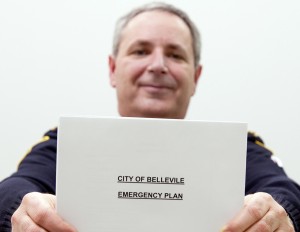Belleville taking measures to prepare for emergency
By Jessica Corriveau

BELLEVILLE, Ont. (02/08/12) - Fire Chief Rhéaume Chaput is Director of Belleville's Fire and Emergency Services, the city department in charge of the Emergency Plan. Photo by Jessica Corriveau
Sarajevo, Bosnia has declared a state of emergency in a cold snap that has shaken Europe. Winter is no stranger in Canada — despite this year’s mild winter — but are we ready for such an emergency?
“An emergency can be defined anytime an event that overwhelms local resources,” said Belleville Fire Chief Rhéaume Chaput. “Where there’s an effect that overwhelms the local resources and we need support either through provincial funding or something of that nature, then it’s quite possibly declared an emergency.”
An emergency response system has been put in place following legislation that passed in 1990, the Emergency Management and Civil Protection Act, which mandates that every region and municipality have an emergency plan. As such, Hastings County, the City of Belleville, and Loyalist College have emergency plans put in place and updated yearly, including dry runs to make sure it all goes smoothly.
According to Natural Resources Canada, natural disasters that have the highest likelihood of occurrence in this area are tornadoes and severe storms. Because Belleville is located in southeastern Ontario, it is near the highest risk area in Canada for tornadoes.
Loyalist offers some resources to students, accessible on their student accounts when they are logged into the school’s computers, or from the resource centre. The resources include a tip sheet on weather indicators of a tornado and a natural disaster plan.
“Typically, if the power is not interrupted, or other main services like water and sanitary, then we’ll keep the building open and there will be limited services to it. If there are major utilities interruptions, mostly gas and hydro, then we would shut the building down and close the building,” said Kirk Fleming, director of facilities services at Loyalist College.
“In a power outage, the common building at the south end of the residence complex actually has an emergency generator, and so that building can be fully powered with that system. Students would go there and stay warm, and there would be power there to run any of the devices within the building,” said Fleming.
Apart from natural disasters, other possible emergencies include technological emergencies such as fire, explosion, utility failure, or a hazardous spill or leak.
Chaput said evacuation is a key element in the city’s emergency plan.
“We have a main hub of train traffic throughout the city of Belleville. We’ve identified that as one of our hazard identifications and we’ve identified that those evacuations routes need to be identified for that case, as well as different means of evacuations. So we have in place now multiple sources of transportation, for example, the city bus system, as well as agreements with the school systems in regards to using their bus systems, and those kinds of things, “ said Chaput.
Loyalist is one of many possible evacuation centres for the County of Hastings, which has its own emergency response plan.
“Our plan would be enacted when several municipalities are involved,” said Doug Socha, community emergency management co-ordinator. “One example, if there was a flood in Belleville, then it’s up to them to decide whether to declare a state of emergency. But if there were a flood in Belleville, Trenton, Napanee, and Deseronto, if there were multiple municipalities involved, if provincial resources were needed, then we would come in.”
With yearly practice runs and updates since the original plan was approved in 2004, officials say Belleville is prepared for the varying dynamics of the emergencies it could be confronted with.
“I’d like to think we’re prepared for more than one. I would say the ones we’re more prepared for are the flooding, weather events, those kinds of events, major traffic issues on the 401. We have plans for that,” said Chaput.
“Sometimes we participate within [Hastings County’s practices] so that we can see how we interact with their facilities and their communication systems. We hold our own once a year as well because we’re mandated by law to do that. Last year was in the fall, the year before, it was in the spring. We try different times of year and different types of events,” said Chaput.
The city of Belleville’s fire department has adopted social media as a resource to communicate with the public.
“Social media is a really important part to emergency management and disaster emergency preparedness. So we now are on board with social media and we hope that we’ll be able to build on it,” said Chaput.
To receive updates, simply like the Facebook page, City of Belleville Fire and Emergency Services, or follow the fire chief’s Twitter, @COBRheaumeChapu.
 Print This Post
Print This Post






